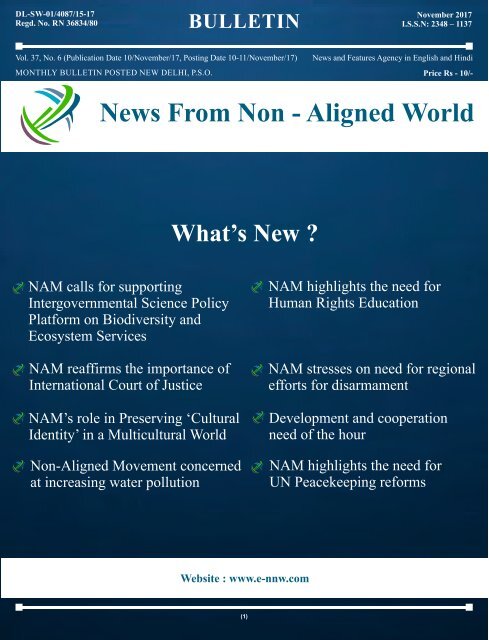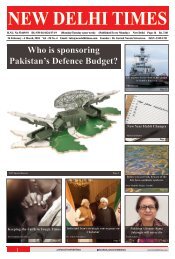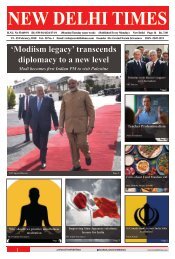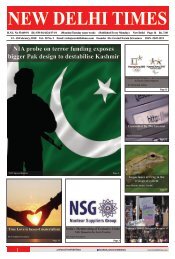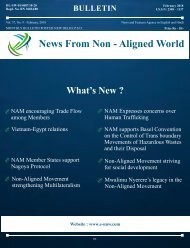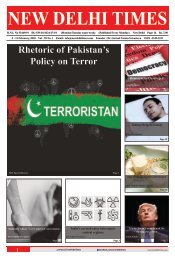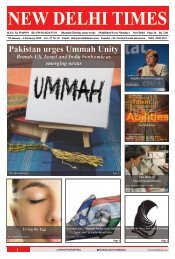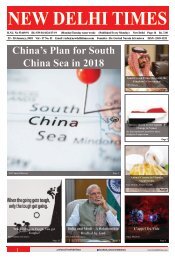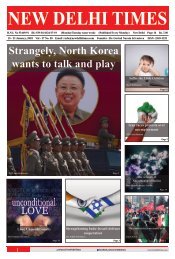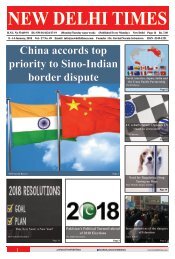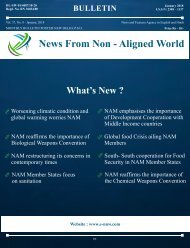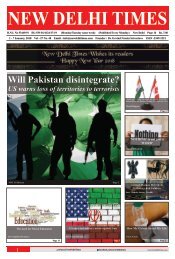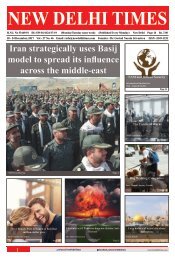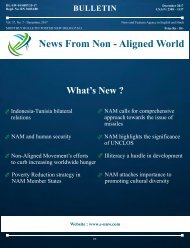10 november 2017_final
Create successful ePaper yourself
Turn your PDF publications into a flip-book with our unique Google optimized e-Paper software.
DL-SW-01/4087/15-17<br />
Regd. No. RN 36834/80<br />
BULLETIN<br />
November <strong>2017</strong><br />
I.S.S.N: 2348 – 1137<br />
Vol. 37, No. 6 (Publication Date <strong>10</strong>/November/17, Posting Date <strong>10</strong>-11/November/17)<br />
MONTHLY BULLETIN POSTED NEW DELHI, P.S.O.<br />
News and Features Agency in English and Hindi<br />
Price Rs - <strong>10</strong>/-<br />
News From Non - Aligned World<br />
What’s New ?<br />
NAM calls for supporting<br />
Intergovernmental Science Policy<br />
Platform on Biodiversity and<br />
Ecosystem Services<br />
NAM reaffirms the importance of<br />
International Court of Justice<br />
NAM’s role in Preserving ‘Cultural<br />
Identity’ in a Multicultural World<br />
Non-Aligned Movement concerned<br />
at increasing water pollution<br />
NAM highlights the need for<br />
Human Rights Education<br />
NAM stresses on need for regional<br />
efforts for disarmament<br />
Development and cooperation<br />
need of the hour<br />
NAM highlights the need for<br />
UN Peacekeeping reforms<br />
Website : www.e-nnw.com<br />
(1)
(2)
News From Non - Aligned World<br />
(3)
Vol. 37, No.6<br />
Date of Publishing -<strong>10</strong> November - 9 December, <strong>2017</strong><br />
I.S.S.N: 2348 – 1137<br />
Regd. No. RN 36834/80<br />
DL-SW-01/4087/15-17<br />
Dr.(Mrs.) Pramila Srivastava<br />
Dr. Ankit Srivastava<br />
Himanshu Sharma<br />
Sujay Dhawan<br />
Pawan Kumar<br />
- Editor-in-Chief<br />
- Editor<br />
- Deputy Director, Research<br />
- Director, Administration<br />
- Director, Development<br />
News From Non - Aligned World<br />
A-2/59, Safdarjung Enclave<br />
New Delhi - 1<strong>10</strong>029<br />
(India)<br />
Ph. No. : +91-11-26<strong>10</strong>2520<br />
Fax : +91- 11- 26196294<br />
E-mail<br />
Web<br />
: info@e-nnw.com<br />
: www.e-nnw.com<br />
Owner, Printer & Publisher<br />
Printed at<br />
Published at<br />
: Dr.(Mrs.)Pramila Srivastava<br />
: Sudhir Printers, 151, Desh Bandhu Gupta Market,<br />
Karol Bagh, New Delhi - 1<strong>10</strong>005<br />
: A-2/ 59, Safdarjung Enclave, New Delhi -1<strong>10</strong> 029 (INDIA)<br />
(4)
Index<br />
• NAM calls for supporting Intergovernmental Science Pg.08<br />
Policy Platform on Biodiversity and Ecosystem Services<br />
• NAM reaffirms the importance of International Court Pg.09<br />
of Justice<br />
• NAM’s role in Preserving ‘Cultural Identity’ in a Pg.<strong>10</strong><br />
Multicultural World<br />
• Non-Aligned Movement concerned at increasing Pg.11<br />
water pollution<br />
• NAM highlights the need for Human Rights Education Pg.12<br />
• NAM stresses on need for regional efforts for Pg.13<br />
disarmament<br />
• Development and cooperation need of the hour Pg.14<br />
• NAM highlights the need for UN Peacekeeping reforms Pg.15<br />
(5)
(6)
From Editor’s Desk<br />
Non-Aligned Movement represents the largest collective voice of<br />
the developing nations. NAM has constantly stressed upon the<br />
need for the smooth functioning of various UN mechanisms and<br />
body. NAM calls for respecting the principles of international<br />
law and in this context, has stressed the important role played<br />
by the International Court of Justice.<br />
As regards the UN Peacekeeping Mission, the Movement has<br />
called for periodic reviews of such mission and to adapt and<br />
devise such mission taking country specific situations into<br />
account.<br />
The Movement not only articulates the political aspirations of<br />
the developing world in the international order, but also focuses<br />
on issues such as environment and protecting biodiversity.<br />
Dr. (Mrs.) Pramila Srivastava<br />
Editor - in - Chief<br />
(7)
News From Non -Aligned World<br />
NAM calls for supporting Intergovernmental<br />
Science Policy Platform on Biodiversity<br />
and Ecosystem Services<br />
By IINS Research Team<br />
The scope and functioning of the Non-Aligned<br />
Movement is not confined to merely international<br />
affairs. The Movement has expressed its concerns at<br />
the environmental issues and as such, NAM Member<br />
States have played an important role on negotiations<br />
and implementation of various plans of action of<br />
major environmental issues such as those pertaining<br />
to climate change and protection of biodiversity.<br />
The Movement has stressed on the need to protect<br />
the biological diversity of the planet and stressed<br />
that earth is a planet with limited resources and<br />
intense human activities, in particular, unsustainable<br />
“In this context, NAM has appreciated the<br />
efforts of the Intergovernmental Science Policy<br />
Platform on Biodiversity and Ecosystem<br />
Services (IPBES). The Intergovernmental<br />
Science-Policy Platform on Biodiversity<br />
and Ecosystem Services is an independent<br />
intergovernmental body, established<br />
by member States in 2012. It provides<br />
policymakers with objective scientific<br />
assessments about the state of knowledge<br />
regarding the planet’s biodiversity, ecosystems<br />
and the benefits they provide to people, as<br />
well as the tools and methods to protect and<br />
sustainably use these vital natural assets”<br />
patterns of production and consumption especially<br />
in developed countries, are affecting the functioning<br />
of Earth’s systems. In this regard, NAM Member<br />
States have expressed that the land, forests, rivers,<br />
wetlands, sea, biodiversity, atmosphere, glaciers and<br />
other components are vital parts of those systems that<br />
need to be preserved, and regenerated to maintain the<br />
balance of life.<br />
In this context, NAM has appreciated the efforts<br />
of the Intergovernmental Science Policy Platform<br />
on Biodiversity and Ecosystem Services (IPBES).<br />
The Intergovernmental Science-Policy Platform on<br />
Biodiversity and Ecosystem Services is an independent<br />
intergovernmental body, established by Member States<br />
in 2012. It provides policymakers with objective<br />
scientific assessments about the state of knowledge<br />
regarding the planet’s biodiversity, ecosystems and<br />
the benefits they provide to people, as well as the tools<br />
and methods to protect and sustainably use these vital<br />
natural assets. This concern is reflected in the United<br />
Nations 2030 Agenda for Sustainable Development<br />
and its Sustainable Development Goals, together with<br />
other key aspirations of society, many of which are<br />
also causing the human impacts on biodiversity and<br />
ecosystem services. Efforts to conserve and sustainably<br />
use biodiversity involve balancing the interests of<br />
different sectors, and this could benefit from an effective<br />
science policy.<br />
IPBES has four major objectives: Strengthen the<br />
capacity and knowledge foundations of the sciencepolicy<br />
interface to implement key functions of the<br />
Platform; Strengthen the science-policy interface on<br />
biodiversity and ecosystem services at and across sub<br />
regional, regional and global levels; Strengthen the<br />
science-policy interface on biodiversity and ecosystem<br />
services with regard to thematic and methodological<br />
issues: and reviews of the effectiveness of guidance,<br />
procedures, methods and approaches to inform future<br />
development of the IPBES Platform. The UNDP views<br />
IPBES as critically important to support implementation<br />
of the new Strategic Plan of the Convention on<br />
Biological Diversity and to promote global sustainable<br />
development. According to UNDP Administrator, Helen<br />
Clark, “We know that healthy ecosystems provide<br />
invaluable services that underpin development,<br />
particularly for the billions of people worldwide who<br />
depend directly on biodiversity for their livelihoods.<br />
We believe that IPBES can help ensure that developing<br />
countries and communities have access to sound<br />
scientific information to inform development policies,<br />
protecting biodiversity and ecosystem services in a way<br />
that addresses poverty alleviation and promotes growth<br />
with equity”.<br />
Contd.....On Page 16<br />
<strong>10</strong> November - 9 December, <strong>2017</strong><br />
(8)
NAM reaffirms the importance of<br />
International Court of Justice<br />
By Dr. Ankit Srivastava, Editor<br />
The International Court of Justice (ICJ), having its<br />
seat in Hague, serves as the principle judicial organ<br />
of the United Nations. Established in June 1945 by<br />
the Charter of the United Nations, the ICJ’s role is<br />
to settle, in accordance with international law, legal<br />
disputes submitted to it by States and to give advisory<br />
opinions on legal questions referred to it by authorized<br />
United Nations organs and specialized agencies.<br />
Non-Aligned Movement, based on the principles of<br />
world peace and the establishment of a just and<br />
equitable international order, has reaffirmed the<br />
ICJ’s role towards the same. NAM has endeavoured<br />
to generate further progress to achieve full respect for<br />
international law and, in this regard, commend the<br />
role of the ICJ in promoting the peaceful settlement of<br />
international disputes, in accordance with the relevant<br />
provisions of the UN Charter and the Statute of the ICJ.<br />
NAM Member States reiterated their support for the<br />
role of ICJ at the 72nd session of the United Nations<br />
General Assembly held on 26 October <strong>2017</strong>. Iran,<br />
speaking on behalf of the Non-Aligned Movement,<br />
reaffirmed and underscored the group’s principled<br />
position concerning the peaceful settlement of disputes<br />
and the non-use or threat of use of force. The Court had<br />
a significant role to play in promoting and encouraging<br />
the peaceful settlement of international disputes in<br />
accordance with the relevant statutes of the Charter<br />
— especially Articles 33 and 94 — and the Statute of<br />
the Court. The Iranian delegate urged the UN Security<br />
Council to make greater use of it as the principal<br />
judicial organ of the United Nations, including as a<br />
source of interpretation of relevant international law.<br />
Philippines, associating itself with the Non-Aligned<br />
Movement, supported the Court’s efforts to adapt<br />
its working methods in response to its increased<br />
workload and to use multimedia platforms and<br />
the Internet to publicize its decisions. Thailand,<br />
associating itself with the Non-Aligned Movement<br />
expressed full confidence in the ICJ and encouraged its<br />
greater use stressing the integrity and independence<br />
of the judges of the ICJ must be maintained.<br />
News From Non -Aligned World<br />
international peace and security. Underscoring the<br />
possibility for the Assembly, the Security Council<br />
and other authorized organs and specialized agencies<br />
of the United Nations to request advisory opinions,<br />
Bangladesh said that it was advisable to submit cases<br />
to the Court on matters that bore “sufficient weight”<br />
in order to free its growing workload from addressing<br />
issues that could be resolved through other legal and<br />
peaceful means. Bangladesh welcomed the Court’s<br />
expanded outreach efforts and recommending that the<br />
ICJ should consider ways to allow eligible students from<br />
developing and least developed countries to benefit<br />
from hands-on experience working with the Court.<br />
Cuba attached great importance to providing the<br />
budgetary resources required for the Court to<br />
appropriately carry out its work, and in that context,<br />
“Non-Aligned Movement, based on the principles<br />
of world peace and the establishment of a just<br />
and equitable international order, has reaffirmed<br />
the ICJ’s role towards the same. NAM has<br />
endeavoured to generate further progress to achieve<br />
full respect for international law and, in this regard,<br />
commend the role of the ICJ in promoting the<br />
peaceful settlement of international disputes, in<br />
accordance with the relevant provisions of the UN<br />
Charter and the Statute of the ICJ”<br />
appealed for efforts to ensure that those resources arrived<br />
in a timely and appropriate manner. Cuba appreciated<br />
the dissemination of materials from the Court, which<br />
were particularly helpful for developing countries.<br />
NAM Member States have thus echoed their<br />
unanimous support towards the activities and the<br />
functional role of ICJ in establishing the norms of<br />
international law. NAM believes that the activities<br />
of the ICJ enlighten and fuel the development of<br />
legal doctrine, and that the implementation of its<br />
decisions must be ensured. A number of NAM Member<br />
States are also of the opinion that the creditability<br />
of the work of the ICJ is heavily contingent of it<br />
taking into the diverse legal systems and languages.<br />
Bangladesh echoed support for the Court’s crucial<br />
role in upholding the rule of law and maintaining<br />
NAM has also urged that the UN Security Council<br />
should work in close cooperation with the ICJ.<br />
(9)<br />
<strong>10</strong> November - 9 December, <strong>2017</strong>
News From Non -Aligned World<br />
NAM’s role in Preserving ‘Cultural Identity’<br />
in a Multicultural World<br />
By IINS Research Team<br />
Non-Aligned movement has articulated often that with<br />
the end of the Cold War and emergence of uni-polarity<br />
there has been a growing need for the Movement to<br />
promote multilateralism while continuing to safeguard<br />
the interests of developing countries. For cultural<br />
identity is essential for the peaceful cooperation of<br />
civilizations. If people have a strong sense of selfidentity<br />
through culture, they are more likely to interact<br />
peacefully with other cultures, with respect for the<br />
diversity of value systems and religious beliefs as well<br />
as the tangible aspects of culture. As different cultures<br />
become more intertwined, these cultural identities may<br />
change. The fluid nature of culture can be positive,<br />
leading to stronger societal structures and values, but<br />
also can destroy minority or less-powerful cultures,<br />
leading to the disintegration of fundamental human<br />
values.<br />
To see a better cultural blend in the present and<br />
perpetuate this practice the movement continues to add<br />
members to its alignment every year, urging them to not<br />
only promote but also encourage cultural cooperation<br />
and respect for cultural diversity among its member<br />
states to further the expression within the individual<br />
countries as well. It has continuously kept it on its<br />
priority list with organising several ministerial meetings<br />
with Ministers of Culture and Officers in charge of<br />
cultural policies of each member state to accomplish<br />
the same. The meetings have found a positive outcome<br />
with member states agreeing for the need to protect<br />
cultural diversity as its duty to mankind, also as a<br />
pressing need of the century to promote respect for<br />
pluralism so to bring about seamless integration based<br />
on cultural development. To bring this to effect NAM<br />
has developed a plan of action in accordance with its<br />
own diversity.<br />
or privileged treatments, as they are damaging to the<br />
principles of equity.<br />
• Resort to all accessible media in order to spread this<br />
diversity and make it known both at the national and<br />
international level.<br />
• Promote multilingualism, in as much as it implies<br />
the acknowledgement of the right and duty of each<br />
country in the world to both make itself understood<br />
and understand others.<br />
• Encourage the trade of information on the compilation,<br />
restoration, social use, distribution and conservation of<br />
the cultural heritage of their countries.<br />
2. The Role of Education and Acceptance<br />
Realising that education is the process through which<br />
this intention can be achieved and disseminated across,<br />
laid down recommendations for this as well.<br />
• Plan and employ cultural and educational policies<br />
that associate the educational system with the social<br />
and cultural setting, based in specific programs related<br />
to the culture of each people.<br />
• Plan and execute educational policies which proclaim<br />
the principles of respect for others and tolerance for<br />
differences, specially addressed to boys and girls, and<br />
youth.<br />
• Devise and put into practice education policies so<br />
to beat the idea of culture as fine arts, and that of<br />
creativity as artistic inspiration. Promoting wider<br />
dimensions of culture and creativity will pave the way<br />
to cultural development for different human groups in<br />
all ranges of age.<br />
1. Cultural tradition and Multiplicity<br />
NAM administers several recommendations for its<br />
member states to help them cherish the diverse cultural<br />
tradition of each nation and within.<br />
• Devise and put into operation plans and programs<br />
to make the inventory, evaluation, dissemination,<br />
recovery, maintenance, rehabilitation, preservation<br />
and use of the national cultural heritage.<br />
3. Inter-communication and Worldwide integration<br />
To promote dialogue and reduce growing negativity of<br />
media, Governments should design and implement<br />
policies to:<br />
• Ensuring all citizens democratic and participatory<br />
access to information and the media.<br />
• Make utmost use of the mass communication industry<br />
• In protecting the cultural diversity, avoid prejudiced Contd.....On Page 16<br />
<strong>10</strong> November - 9 December, <strong>2017</strong><br />
(<strong>10</strong>)
Non-Aligned Movement concerned at<br />
increasing water pollution<br />
By IINS Research Team<br />
Over two thirds of Earth’s surface is covered by water;<br />
less than a third is taken up by land. As Earth’s<br />
population continues to grow, people are putting everincreasing<br />
pressure on the planet’s water resources. In<br />
a sense, our oceans, rivers, and other inland waters are<br />
being “squeezed” by human activities—not so they take<br />
up less room, but so their quality is reduced. Poorer<br />
water quality means water pollution.<br />
Our rivers, lakes, aquifers, and coastal waters aren’t<br />
unlimited resources that can handle whatever we take<br />
out or dump in. These waters need protection. The<br />
populace needs to understand the urgent call for doing<br />
so before they run out of the source that sustains most<br />
life on the planet and NAM has taken it upon itself to<br />
illuminate the masses.<br />
News From Non -Aligned World<br />
Most of its states have been on the verge of either<br />
water scarcity problem or issues of impure water<br />
complicating the matter further. Desalination plants<br />
are an overuse of water resources in the Middle East.<br />
70% of desalination plants in the world are located in<br />
this area, found mostly in Saudi Arabia, UAE, Kuwait<br />
and Bahrain. These Gulf countries are famous as oil<br />
export countries that make the climate harsh and<br />
may cause of falling level of water. GCC governments<br />
have earmarked more than $<strong>10</strong>0 billion in their water<br />
sectors between 2011 and 2016 to improve desalination<br />
technologies involving solar energy, and maximize on<br />
wastewater treatments and recycling.<br />
The Arab world is likely to witness a vulnerable water<br />
crisis around 2025 unless efficient guiding mechanisms<br />
A country is said to experience water stress when annual<br />
water supplies drop below 1,700 cubic meters per<br />
person. When supplies drop below 1,000 cubic meters<br />
per person per year, the country faces water scarcity<br />
for all. Population Action International (PAI) estimated<br />
that 31 countries, half a billion people, regularly faced<br />
rather water stress or water scarcity. In 2025, 48<br />
countries in which about 3 billion people are living will<br />
face water shortages. By 2050, 54 countries containing<br />
4 billion people, or 40 per cent of the projected world<br />
population of 9.4 billion, will have a shortage of water.<br />
In 1999, some 400 of 600 major Chinese cities were<br />
suffering from severe water crisis. Of these, 30 cities<br />
in northern China, including Beijing, was facing longterm<br />
shortages severe enough to limit their economic<br />
development.<br />
NAM in its last two summits has convened a table to<br />
discuss the issue of water crisis and the escalating<br />
water pollution which threatens most if its member<br />
states. The crisis is serious it states and demands each<br />
country to take measures to conserve water through<br />
methods of rain water harvesting and planting more<br />
trees along with keeping a regular tab on underground<br />
water-level so to device measures to replenish them<br />
when reaches danger levels. It urges them accordingly<br />
distribute water in their particular regions, while<br />
educating its masses to not only conserve water but be<br />
also able to produce it through various steps to do so.<br />
“NAM in its last two summits has convened a table to<br />
discuss the issue of water crisis and the escalating<br />
water pollution which threatens most if its member<br />
states. The crisis is serious it states and demands<br />
each country to take measures to conserve water<br />
through methods of rain water harvesting and<br />
planting more trees along with keeping a regular tab<br />
on underground water-level so to device measures to<br />
replenish them when reaches danger levels”<br />
for sustainable water management and measures<br />
to reduce the agricultural consumption of water are<br />
applied. The UAE has planned several wastewater<br />
treatment and recycling projects to improve water<br />
management practices in order to meet rising demand<br />
of this scarce and costly resource. An important goal of<br />
the World Water Assessment Programme, founded in<br />
2000 by Non-aligned movement within the Commission<br />
on Sustainable Development, is therefore to assist<br />
governments in developing and implementing their<br />
national water management plans. Although progress<br />
is being made in some areas, such as the recognition<br />
of water rights, other needed reforms - such as<br />
decentralization - have been slow to come.NAM member<br />
countries have adopted several other sustainable<br />
strategies to reduce water consumption and wastage<br />
as well. Water is crucial for life and so needs much<br />
attention from every member country to deal efficiently<br />
towards resolving the crisis and also decentralization of<br />
water is important to deal with the problem of scarcity.<br />
(11)<br />
<strong>10</strong> November - 9 December, <strong>2017</strong>
News From Non -Aligned World<br />
NAM highlights the need for<br />
Human Rights Education<br />
By IINS Research Team<br />
Human rights education and training is essential<br />
to the effective realization of human rights and<br />
fundamental freedoms and contributes significantly to<br />
promoting equality, preventing conflict and human rights<br />
violations and abuses, and enhancing participation<br />
and democratic processes with a view to developing<br />
societies in which all human beings are valued and<br />
respected, without discrimination or distinction of any<br />
kind, such as race, colour, sex, language, religion,<br />
political, or other opinion, national or social origin,<br />
property, birth or other status.<br />
The United Nations Declaration on Human Rights<br />
Education and Training acknowledges the fundamental<br />
importance of human rights education and training in<br />
contributing to the promotion, protection and effective<br />
realization of all human rights, and states that human<br />
rights education should include peace, democracy,<br />
development and social justice, as set forth in<br />
international and regional human rights instruments,<br />
in order to achieve common understanding and<br />
awareness with a view to strengthening universal<br />
commitment to human right. Article 1 recognizes the<br />
right to “know, seek and receive information about all<br />
human rights and fundamental freedoms” and access<br />
to Human Rights Education and Training which is<br />
essential for the promotion of universal respect for<br />
human rights and fundamental freedoms for all. At<br />
the same time human rights, particularly the right<br />
to education allows for access to Human Rights<br />
Education and Training. Comprising “all education,<br />
training, information, awareness-raising and learning<br />
activities aimed at promoting universal respect for and<br />
observance of human rights and fundamental freedom.<br />
It calls for strengthening of human rights institutions.<br />
a) Raising awareness, understanding and acceptance<br />
of universal human rights standards and principles,<br />
as well as guarantees at the international, regional<br />
and national levels for the protection of human rights<br />
and fundamental freedoms;<br />
(b) Developing a universal culture of human rights,<br />
in which everyone is aware of their own rights and<br />
responsibilities in respect of the rights of others, and<br />
promoting the development of the individual as a<br />
responsible member of a free, peaceful, pluralist and<br />
inclusive society;<br />
(c) Pursuing the effective realization of all human<br />
rights and promoting tolerance, non-discrimination<br />
and equality;<br />
(d) Ensuring equal opportunities for all through<br />
access to quality human rights education and<br />
training, without any discrimination;<br />
(e) Contributing to the prevention of human rights<br />
violations and abuses and to the combating and<br />
eradication of all forms of discrimination, racism,<br />
stereotyping and incitement to hatred, and the harmful<br />
attitudes and prejudices that underlie them.<br />
A number of NAM Member States have undertaken to<br />
impart human rights education and integrate it in their<br />
formal education curriculum. In India, for the primary<br />
and secondary education level the National Council of<br />
Educational Research and Training (NCERT) has made<br />
a significant contribution by developing a national<br />
curriculum that has infused human rights elements in<br />
social science paper at school level.<br />
The Non-Aligned Movement has recognised the role and<br />
significance of human rights education, as a part of<br />
its principled objective of protection and promotion of<br />
human rights. NAM has, in this regard, welcomed the<br />
adoption by the General Assembly of resolution 66/137<br />
pertaining to the United Nations declaration on human<br />
rights education and training.<br />
The Resolution states that human rights education<br />
and training should be based on the principles<br />
of the Universal Declaration of Human Rights and<br />
relevant treaties and instruments, with a view to:<br />
In Indonesia, subjects such as Pancasila (state ideology)<br />
and Civics Education, Social Studies, including History,<br />
and Bahasa Indonesia (the national language) are closely<br />
related to human rights issues. Junior and senior high<br />
schools offer the same subjects as well as Sociology and<br />
Anthropology, which are also closely related to human<br />
rights issues.<br />
NAM also support the development of national<br />
action plans on human rights education and their<br />
implementation by providing funds and technical<br />
support.<br />
<strong>10</strong> November - 9 December, <strong>2017</strong><br />
(12)
NAM stresses on need for regional efforts<br />
for disarmament<br />
By IINS Research Team<br />
Disarmament and elimination of nuclear weapons<br />
and Weapons of Mass Destruction has one of the<br />
cornerstone objectives on the Non-Aligned Movement<br />
since its inception. NAM has also stressed on the<br />
need for regional cooperation to advance common<br />
disarmament priorities and address global security<br />
challenges. NAM Member States highlighted stressed<br />
on this aspect at the First Committee (Disarmament<br />
and International Security) meeting in the 72nd session<br />
of the UN General Assembly held on 24 October <strong>2017</strong>.<br />
Egypt stressed on the implementation of the proposal<br />
presented by the Non‐Aligned Movement at the 2015<br />
Review Conference of the Parties to the Treaty on the<br />
Non‐Proliferation of Nuclear Weapons and stressed<br />
the need for regional cooperation for creating a clear<br />
road map aimed at starting negotiations to conclude a<br />
legally binding treaty establishing a Middle East zone<br />
free of nuclear weapons.<br />
Bangladesh stressed that peaceful dialogue and diplomacy<br />
remained the best option for building sound regional<br />
security architecture and emphasized the need for<br />
establishing a nuclear‐weapon‐free zone in the Middle<br />
East in the interest of sustainable peace and stability<br />
in the region. Recognizing the useful role of the United<br />
Nations Regional Centre for Peace and Disarmament<br />
in Asia and the Pacific in convening relevant experts<br />
and policymakers to share views on issues of concern,<br />
Bangladesh said that the country benefited greatly<br />
from the centre’s customized support in promoting the<br />
implementation of the Programme of Action to Prevent,<br />
Combat and Eradicate the Illicit Trade in Small Arms<br />
and Light Weapons in All Its Aspects.<br />
Cuba stressed the importance of regional and subregional<br />
initiatives in proclaiming zones free of nuclear<br />
weapons and weapons of mass destruction and<br />
mentioned that the proclamation of Latin America and<br />
the Caribbean as a zone of peace promoted general and<br />
complete disarmament and enabled confidence‐building<br />
in the region. Cuba also mentioned the importance of<br />
establishing a nuclear‐weapon‐free zone in the Middle<br />
East as a fundamental step for regional peace. Cuba<br />
also recognised the valuable work of the United Nations<br />
regional centres for peace and disarmament.<br />
News From Non -Aligned World<br />
deep concern at the lack of a nuclear‐weapons‐free<br />
zone in the Middle East and underlined the importance<br />
of technical and financial assistance to stem the<br />
proliferation of nuclear weapons. Algeria stressed on<br />
the need for strengthening of security and cooperation<br />
in the Mediterranean region.<br />
United Arab Emirates supported international efforts<br />
to end Iranian activities that undermined security<br />
and stability in the region. It also supported the First<br />
Committee’s efforts geared towards adopting effective<br />
measures that would contribute to the promotion of<br />
regional and international peace.<br />
Peru highlighted the varied efforts of the United<br />
Nations Regional Centre for Peace, Disarmament and<br />
Development in Latin America and the Caribbean and<br />
how Member States benefited from technical and legal<br />
assistance, and from training in marking, destruction<br />
“Egypt stressed on the implementation of<br />
the proposal presented by the Non‐Aligned<br />
Movement at the 2015 Review Conference<br />
of the Parties to the Treaty on the<br />
Non‐Proliferation of Nuclear Weapons and<br />
stressed the need for regional cooperation for<br />
creating a clear road map aimed at starting<br />
negotiations to conclude a legally binding<br />
treaty establishing a Middle East zone free of<br />
nuclear weapons”<br />
and tracing of small weapons as part of an initiative<br />
to promote the implementation of the International<br />
Tracing Instrument and the Programme of Action on<br />
Small Arm.<br />
Nepal highlighted the important role of regional centres<br />
in promoting international peace and security, and<br />
encouraged them to partner with youth, the private<br />
sector and civil society to develop confidence‐building<br />
measures and to act as a repository of best practices<br />
and said that they should also be strengthened to fulfil<br />
their mandates. Nepal mentioned that in partnership<br />
with the United Nations Regional Centre for Peace<br />
and Disarmament in Asia and the Pacific, the country<br />
Algeria stressed the country’s emphasis on regional<br />
solidarity on security issues and its correspondingly Contd.....On Page 16<br />
(13)<br />
<strong>10</strong> November - 9 December, <strong>2017</strong>
News From Non -Aligned World<br />
Development and cooperation<br />
need of the hour<br />
By IINS Research Team<br />
The dictionary defines the term “development” as, “The<br />
systematic use of scientific and technical knowledge<br />
to meet specific objectives or requirements” or “An<br />
extension of the theoretical or practical aspects of<br />
a concept, design, discovery, or invention” or “The<br />
process of economic and social transformation that is<br />
based on complex cultural and environmental factors<br />
and their interactions” or “The process of adding<br />
improvements to a parcel of land, such as grading,<br />
subdivisions, drainage, access, roads, utilities,”<br />
depending upon the context. However, development<br />
is seen as almost always interrelated with the human<br />
well-being , but more than improvements in people’s<br />
well-being: it also describes the capacity of the system<br />
to provide the circumstances for that continued wellbeing.<br />
Development is a characteristic of the system;<br />
sustained improvements in individual well-being are a<br />
yardstick by which it is judged. Therefore, development<br />
could be seen as an umbrella term, an amalgamation<br />
of all the above mentioned definitions. From its varied<br />
steps to curb poverty, illiteracy, facilitate better living<br />
conditions, uplift economy and the condition of women<br />
and the human kind in general along with various<br />
other predicaments plaguing the NAM countries. NAM<br />
has consistently maintained the need for south-south<br />
cooperation for the better functioning of the movement<br />
and its cause. Non-Aligned Movement not only feels<br />
the need for south-south cooperation but has on many<br />
summits pointed out need for revitalising international<br />
cooperation for a holistic development of the world.<br />
It iterates the need for reactivation and reinforcement<br />
of global co-operation for development in order<br />
to make possible an increased involvement by<br />
developing countries in the global economy on terms<br />
of assistance to them and show progress with their<br />
developmental efforts. In this context NAM called for a<br />
new and improved weightage on technical assistance<br />
in the growth and co-operation programmes of the<br />
UN system, together with specialised international<br />
agencies. Also with the increasing need for more<br />
efficient and improved contribution in the global<br />
economy by developing countries, especially in the<br />
intercontinental and economic decisions and rulemaking,<br />
needs the easier accession and facilitation of<br />
developing countries applying for membership to the<br />
World Trade Organisation (WTO) without involving<br />
any political or economic issues keeping in view of<br />
WTO’ s universality along with its non-discriminatory<br />
character. They reiterate the need for developing<br />
countries to have result-oriented consultations among<br />
themselves to promote more effective participation in<br />
WTO. It emphasises on the need of a more encouraging<br />
and active intercontinental economic atmosphere and<br />
revitalised intercontinental development co-operation<br />
accommodating and supportive of developing countries’<br />
endeavour for the accomplishment of the various<br />
goals of poverty eradication, economic and social<br />
progress, sustained economic growth and sustainable<br />
development globally. NAM blatantly rejects all attempts<br />
to use conditionalities such as values of environmental<br />
protection, labour standards, intellectual property<br />
protection, sound macro-economic management and<br />
promotion and protection of all human rights as pretexts<br />
for curbing market access, help or assistance and<br />
technology flow to developing countries or connecting<br />
them to the multiparty trade negotiations.<br />
NAM has expressed concern over the apparent<br />
deficiency of political determination and resolve on<br />
the part of developed countries to revive international<br />
co-operation for development. According to NAM’s<br />
statement “We are convinced that ODA continues to<br />
constitute an important source of financial flows for<br />
many developing countries, particularly LDCs. In this<br />
context, we are deeply concerned over the continued<br />
decline of the official development assistance and call<br />
on the developed countries to ensure the fulfilment of<br />
their commitment to meet the United Nations target of<br />
0.7% of their GNP as official development assistance<br />
for all the developing countries latest by the end of<br />
the first decade of the twenty first century, as well<br />
as to meet the UN target of 0.15% of their GNP to<br />
LDCs as soon as possible.” Therefore NAM in order<br />
to fill this gap and lack emphasises on the value of<br />
discourse and talk on strengthening international<br />
co-operation for development through collaboration<br />
based on the mutuality of interests and benefits,<br />
common but differentiated responsibilities and genuine<br />
interdependence. NAM strongly believes that talks and<br />
dialogue can serve as a useful forum to talk about<br />
emerging global issues to fortify international cooperation<br />
for development through real collaboration.<br />
It underscores the need for active participation of the<br />
members of the Movement in the process leading to the<br />
next dialogue.<br />
<strong>10</strong> November - 9 December, <strong>2017</strong><br />
(14)
NAM highlights the need for UN<br />
Peacekeeping reforms<br />
By Dr. Pawan Mathur<br />
Since its inception, the Non-Aligned Movement has<br />
played a significant contribution towards maintaining<br />
international peace and security. NAM regards peacekeeping<br />
as the flagship activity of the United Nations. NAM believes<br />
that the primary responsibility for the maintenance<br />
of international peace and security rests with the UN<br />
and that the role of regional arrangements, in that<br />
regard, should be in accordance with Chapter VIII of<br />
the Charter, and should not in any way substitute the<br />
role of the UN, or circumvent the full application of the<br />
guiding principles of the UN peacekeeping operations.<br />
“At the 17th Meeting of the 72nd Session of the UN<br />
General Assembly on 25 October <strong>2017</strong>, NAM has<br />
called for a more cautious and careful approach<br />
to UN peacekeeping. Non‐Aligned Movement<br />
welcomed the interactive nature of the Department’s<br />
consultations with Member States in the review<br />
process, which would help to reinforce confidence<br />
between the key stakeholders in peace and security,<br />
namely States and members of the Security Council,<br />
and the Secretariat. NAM underlined the creation<br />
of the new Department of Peace Operations, which<br />
was indicative of a big shift from “peacekeeping<br />
operations” to “peace operations”<br />
At the 17th Meeting of the 72nd Session of the UN<br />
General Assembly on 25 October <strong>2017</strong>, NAM has<br />
called for a more cautious and careful approach to UN<br />
peacekeeping. Non‐Aligned Movement welcomed the<br />
interactive nature of the Department’s consultations<br />
with Member States in the review process, which<br />
would help to reinforce confidence between the key<br />
stakeholders in peace and security, namely States and<br />
members of the Security Council, and the Secretariat.<br />
NAM underlined the creation of the new Department of<br />
Peace Operations, which was indicative of a big shift<br />
from “peacekeeping operations” to “peace operations”.<br />
That move should also be examined carefully and<br />
comprehensively to ensure consensus among Member<br />
States on the development of its policies.<br />
NAM has emphasised that the establishment of any<br />
peacekeeping operation, or extension of the mandate of<br />
existing operations, must strictly observe the purposes<br />
and principles of the United Nations Charter, as well<br />
News From Non -Aligned World<br />
as the principles of impartiality, non‐use of force and<br />
consent of the parties. NAM has also stressed the need<br />
for a strong and clear Security Council commitment to<br />
draft clear and achievable mandates, in consultation with<br />
troop and police‐contributing countries as necessary for<br />
the development of integrated planning.<br />
NAM believes that the link between the formulation of<br />
policy and implementation on the ground is paramount<br />
to achieve success of UN peacekeeping mission. The<br />
Movement has also reiterated the importance of<br />
protecting civilians and the need for peacekeeping to<br />
support national civilian‐protection efforts.<br />
At the 72nd UNGA session, Indonesia, associating<br />
the country’s statement with that of Non-Aligned<br />
Movement, stated that <strong>2017</strong> marked a renewed<br />
approach to peacekeeping marked by the concept of<br />
“sustaining peace” and the incorporation of prevention<br />
and conflict‐resolution elements into peace building<br />
and long term development. It was important to ensure<br />
that all missions could deliver on their mandates and<br />
to guarantee the safety and security of peacekeepers,<br />
reaffirming the continued relevance of the basic<br />
principles of peacekeeping, including consent of the<br />
parties, impartiality and non‐use of force except in<br />
self‐defence and defence of the mandate.<br />
Indonesia called for increased consultations with troopand<br />
police‐contributing countries in the current process<br />
of reforming the peace and security architecture.<br />
Operations transitioning from peacekeeping into<br />
political or special political missions required sufficient<br />
capacities and financing, while the United Nations<br />
system must increase its focus on the safety, security<br />
and well‐being of peacekeepers and related civilian<br />
staff. Iran, too associating itself with NAM, stated<br />
that Peacekeeping operations should be guided by<br />
the United Nations Charter, and the respect for the<br />
principles of sovereign equality, political independence,<br />
territorial integrity and non‐intervention in matters of<br />
exclusively domestic jurisdiction.<br />
India, associating with the Non‐Aligned Movement,<br />
noted that whereas decisions on peacekeeping<br />
mandates were within the purview of the Security<br />
Council, longer‐term development issues were dealt<br />
with outside that forum, a situation that presented<br />
(15)<br />
<strong>10</strong> November - 9 December, <strong>2017</strong>
News From Non -Aligned World<br />
coordination challenges. While peacekeepers confronted<br />
increasingly complex and dangerous security challenges,<br />
their mandates were becoming less clearly defined and<br />
far less adequately resourced.<br />
As the largest cumulative troop contributor, India<br />
understood the evolving complexities, and noted that<br />
the country’s peacekeepers had long acted proactively<br />
in defence of mandates now being described as for<br />
the protection of civilians. India had worked with the<br />
Organization and with partner countries to help with<br />
the training of peacekeepers, especially women and<br />
partners in Africa. NAM has called for adherence to all<br />
relevant Council resolutions as well as consultations<br />
with concerned States — including host countries –<br />
and has stated that the priorities of the latter must<br />
be considered, especially when designing and devising<br />
mission mandates and exit strategies in order to<br />
ensure the smooth functioning of the United Nations<br />
Peacekeeping operations.<br />
NAM calls for supporting......<br />
NAM Member States have been actively engaging in the<br />
work of the IPBES. It may be mentioned here that the<br />
UNDP managed Bio-diversity and Ecosystem Services<br />
Network (BES-Net) and the UNEP-WCMC hosted Sub-<br />
Global Assessment Network (SGA Network) projects<br />
are aimed at providing technical and capacity building<br />
support to specific countries to conduct national<br />
assessments of scientific evidence on policy issues.<br />
SGA Network capacity building workshop was held<br />
from 24 to 28th August 2015 in Addis Ababa, Ethiopia.<br />
The city of Dehradun in India hosted the First IPBES<br />
Contd.....from Page 8<br />
Capacity Building Forum, from 19-22 October 2015.<br />
NAM has welcomed adoption of the work programme<br />
of the Intergovernmental Science-Policy Platform<br />
on Biodiversity and Ecosystem Services for 2014-<br />
2018, and encourage further participation of<br />
all member states, in particular representatives<br />
of developing countries, in contributing to the<br />
scoping process for the global and regional<br />
commitments of the Intergovernmental Science-<br />
Policy Platform on Biodiversity and Ecosystem<br />
Services.<br />
NAM’s role in Preserving ‘Cultural......<br />
to propagate the pluralism of member countries.<br />
• In the era of globalization, pursue a leading role for the<br />
media as culture promoters, by means of a redefinition<br />
of the communicator individual in the light of culture.<br />
• Launch marketing and information drives and<br />
campaigns.<br />
4. Cultural development<br />
The Ministers and officers in charge of cultural policies<br />
recommended that governments:<br />
• Assume culture as a matter of State within their<br />
development plans and programs, acknowledging<br />
Contd.....from Page <strong>10</strong><br />
cultural development and cultural rights as fundamental<br />
concepts.<br />
• Find appropriate ways and means to achieve balance<br />
between development and the preservation of the<br />
cultural heritage.<br />
• Introduce legislation aimed to promote, disseminate<br />
and respect cultural rights.<br />
Non-Aligned Movement according to many may have<br />
lost its appeal but under the wraps of its collaboration<br />
it continues to work for the entire globe in order to<br />
maintain peace and harmony while, continuing to take<br />
measures to raise the global living standards.<br />
NAM stresses on need for......<br />
had encouraged confidence‐building measures in<br />
the region and had also organized a conference on<br />
the implementation of resolution 1540 (2004). The<br />
Movement has thus stressed on regional cooperation<br />
Contd.....from Page 13<br />
and in this context, the important role played by the<br />
UN Regional Centres on Disarmament which engage in<br />
cooperation regional and sub-regional organisations on<br />
disarmament-related issues.<br />
<strong>10</strong> November - 9 December, <strong>2017</strong><br />
(16)
Regd. No. RN 36834/80<br />
Phone : 26<strong>10</strong>2520, 26<strong>10</strong>5846<br />
Fax : (91-11) 26196294<br />
E-mail : info@e-nnw.com<br />
Web : www.e-nnw.com<br />
NEWS FROM NON-ALIGNED WORLD<br />
(A News and Features Agency in English and Hindi)<br />
SUBSCRIPTION FORM<br />
Name:____________________________________________________________________________________<br />
Company/Department : ______________________________________________________________________<br />
Office Address : ___________________________________________________________________________<br />
________________________________________________________________________________________<br />
Phone : _______________________________________Fax : ____________________________________<br />
E- mail : ______________________________________Web : ___________________________________<br />
Residence Address : ________________________________________________________________________<br />
_______________________________________________________________________________________<br />
Phone : ______________________________________ E-mail : ___________________________________<br />
Date ......................... .............................................................<br />
Signature<br />
Note : Please fill the above form and send us for the continued delivery of NNW Bulletin.<br />
(17)
(18)
(19)
DL-SW-01/4087/15-17<br />
Regd. No. RN 36834/80 Total Pages - 20<br />
Publishing Date <strong>10</strong> November, <strong>2017</strong><br />
Posting Date <strong>10</strong>-11 November, <strong>2017</strong><br />
News From Non - Aligned World<br />
www.e-nnw.com<br />
Owner, Printer and Publisher: Dr. (Mrs.) Pramila Srivastava, Printed at Sudhir Printers, 151, Desh Bandhu Gupta Market,<br />
Karol Bagh, New Delhi - 1<strong>10</strong>005, Published at A-2/59 Safdarjung Enclave, New Delhi-1<strong>10</strong>029.<br />
(20)


